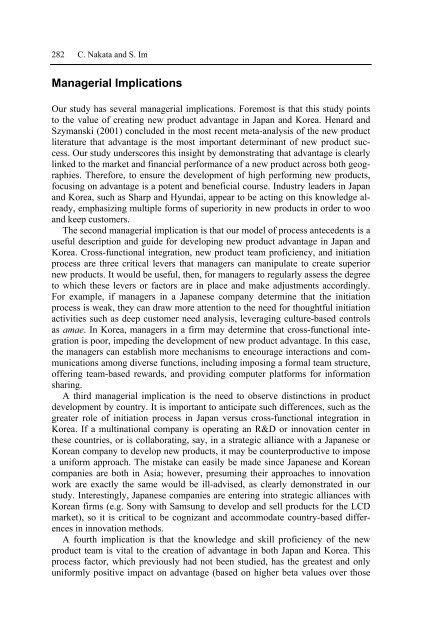Management of Technology and Innovation in Japan
Management of Technology and Innovation in Japan
Management of Technology and Innovation in Japan
Create successful ePaper yourself
Turn your PDF publications into a flip-book with our unique Google optimized e-Paper software.
282 C. Nakata <strong>and</strong> S. Im<br />
Managerial Implications<br />
Our study has several managerial implications. Foremost is that this study po<strong>in</strong>ts<br />
to the value <strong>of</strong> creat<strong>in</strong>g new product advantage <strong>in</strong> <strong>Japan</strong> <strong>and</strong> Korea. Henard <strong>and</strong><br />
Szymanski (2001) concluded <strong>in</strong> the most recent meta-analysis <strong>of</strong> the new product<br />
literature that advantage is the most important determ<strong>in</strong>ant <strong>of</strong> new product success.<br />
Our study underscores this <strong>in</strong>sight by demonstrat<strong>in</strong>g that advantage is clearly<br />
l<strong>in</strong>ked to the market <strong>and</strong> f<strong>in</strong>ancial performance <strong>of</strong> a new product across both geographies.<br />
Therefore, to ensure the development <strong>of</strong> high perform<strong>in</strong>g new products,<br />
focus<strong>in</strong>g on advantage is a potent <strong>and</strong> beneficial course. Industry leaders <strong>in</strong> <strong>Japan</strong><br />
<strong>and</strong> Korea, such as Sharp <strong>and</strong> Hyundai, appear to be act<strong>in</strong>g on this knowledge already,<br />
emphasiz<strong>in</strong>g multiple forms <strong>of</strong> superiority <strong>in</strong> new products <strong>in</strong> order to woo<br />
<strong>and</strong> keep customers.<br />
The second managerial implication is that our model <strong>of</strong> process antecedents is a<br />
useful description <strong>and</strong> guide for develop<strong>in</strong>g new product advantage <strong>in</strong> <strong>Japan</strong> <strong>and</strong><br />
Korea. Cross-functional <strong>in</strong>tegration, new product team pr<strong>of</strong>iciency, <strong>and</strong> <strong>in</strong>itiation<br />
process are three critical levers that managers can manipulate to create superior<br />
new products. It would be useful, then, for managers to regularly assess the degree<br />
to which these levers or factors are <strong>in</strong> place <strong>and</strong> make adjustments accord<strong>in</strong>gly.<br />
For example, if managers <strong>in</strong> a <strong>Japan</strong>ese company determ<strong>in</strong>e that the <strong>in</strong>itiation<br />
process is weak, they can draw more attention to the need for thoughtful <strong>in</strong>itiation<br />
activities such as deep customer need analysis, leverag<strong>in</strong>g culture-based controls<br />
as amae. In Korea, managers <strong>in</strong> a firm may determ<strong>in</strong>e that cross-functional <strong>in</strong>tegration<br />
is poor, imped<strong>in</strong>g the development <strong>of</strong> new product advantage. In this case,<br />
the managers can establish more mechanisms to encourage <strong>in</strong>teractions <strong>and</strong> communications<br />
among diverse functions, <strong>in</strong>clud<strong>in</strong>g impos<strong>in</strong>g a formal team structure,<br />
<strong>of</strong>fer<strong>in</strong>g team-based rewards, <strong>and</strong> provid<strong>in</strong>g computer platforms for <strong>in</strong>formation<br />
shar<strong>in</strong>g.<br />
A third managerial implication is the need to observe dist<strong>in</strong>ctions <strong>in</strong> product<br />
development by country. It is important to anticipate such differences, such as the<br />
greater role <strong>of</strong> <strong>in</strong>itiation process <strong>in</strong> <strong>Japan</strong> versus cross-functional <strong>in</strong>tegration <strong>in</strong><br />
Korea. If a mult<strong>in</strong>ational company is operat<strong>in</strong>g an R&D or <strong>in</strong>novation center <strong>in</strong><br />
these countries, or is collaborat<strong>in</strong>g, say, <strong>in</strong> a strategic alliance with a <strong>Japan</strong>ese or<br />
Korean company to develop new products, it may be counterproductive to impose<br />
a uniform approach. The mistake can easily be made s<strong>in</strong>ce <strong>Japan</strong>ese <strong>and</strong> Korean<br />
companies are both <strong>in</strong> Asia; however, presum<strong>in</strong>g their approaches to <strong>in</strong>novation<br />
work are exactly the same would be ill-advised, as clearly demonstrated <strong>in</strong> our<br />
study. Interest<strong>in</strong>gly, <strong>Japan</strong>ese companies are enter<strong>in</strong>g <strong>in</strong>to strategic alliances with<br />
Korean firms (e.g. Sony with Samsung to develop <strong>and</strong> sell products for the LCD<br />
market), so it is critical to be cognizant <strong>and</strong> accommodate country-based differences<br />
<strong>in</strong> <strong>in</strong>novation methods.<br />
A fourth implication is that the knowledge <strong>and</strong> skill pr<strong>of</strong>iciency <strong>of</strong> the new<br />
product team is vital to the creation <strong>of</strong> advantage <strong>in</strong> both <strong>Japan</strong> <strong>and</strong> Korea. This<br />
process factor, which previously had not been studied, has the greatest <strong>and</strong> only<br />
uniformly positive impact on advantage (based on higher beta values over those


